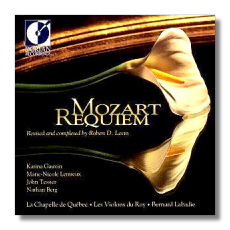
The Internet's Premier Classical Music Source
Related Links
- Mozart Reviews
- Latest Reviews
- More Reviews
-
By Composer
-
Collections
DVD & Blu-ray
Books
Concert Reviews
Articles/Interviews
Software
Audio
Search Amazon
Recommended Links
Site News
 CD Review
CD Review
Wolfgang Mozart

Requiem in D minor, K. 626
Completed by Robert D. Levin
- Karina Gauvin (soprano)
- Marie-Nicole Lemieux (contralto)
- John Tessier (tenor)
- Nathan Berg (bass)
La Chapelle de Québec
Les Violons du Roy/Bernard Labadie
Dorian DOR-90310 DDD 52:55
I prefer not to hear Mozart's Requiem inflated into a name-brand, economy-sized extravaganza, although that was the tradition throughout much of the Twentieth Century. Later in the century, research into the instruments and performance practices current during Mozart's lifetime led to a trimming of the fat from some of the Classical era's more (to me) overbearing masterpieces, particularly the Requiem. It is not just a coincidence, then, that my favorite Requiems on CD are those which feature, if not "authentic instruments," then at least a style of performance consistent with what Mozart might have imagined as he was writing the work. Levin's completion – a relatively recent entry into the field – is gaining in popularity. Those who know Süssmayr's version will be surprised in a few places, but I think they will find Levin more inspired and more Mozartean than Süssmayr.
This beautiful new recording is quite a feather in the cap for Dorian. The dependability and (let's face it) more gracious tonal qualities of modern instruments are complemented by conductor Bernard Labadie's concern for historical and stylistic authenticity. A total of twenty-seven instrumentalists, including nine violinists (five firsts and four seconds), are credited in Dorian's booklet, and the result is an intimacy and a litheness that will seem scrawny only to those raised on the old-fashioned barn-burner recordings by Herbert von Karajan and his like. (Not much string vibrato is used, which "antiquates" the sound as much as it needs to be.) Little things such as the audible punctuation of organ chords add to the sensation that we are listening to a musical edifice that is grand and airy. Labadie's tempos are faster than what many older listeners will be used to, but I never found them to be unmusical. Even a Requiem can have its moments of joy, or at least confidence.
Similarly, there are fewer than forty choristers in La Chapelle de Québec, and their young, penetrating sound takes Mozart's Requiem off its pedestal and gives it dramatic immediacy. (It is worth mentioning here that this live recording from the Troy Savings Bank Music Hall was taken from a concert given just nine days after September 11, 2001.) Granted, there are choruses who sing this music with more refinement, but I like the Chapelle's sharp edges and energy very much.
Star soloists are not a necessity in this work. In fact, they wrongly shift the work's center of gravity away from the chorus. Labadie's four soloists, while not "big names." are hardly provincial; I wouldn't mind hearing more from all of them. They nicely complement the chorus and the orchestra, they sound attractive, and they ultimately make a memorable contribution to this recording.
If there's a more naturally engineered Mozart Requiem, I haven't heard it. This CD sounds excellent at lower listening levels, and outstanding at higher ones. Dorian has used 24-bit analog-to-digital converters and HDCD technology to come up with sound that is both spectacular and realistic.
This probably will be one of Dorian's best-selling discs, and it deserves to be.
Copyright © 2002, Raymond Tuttle


















